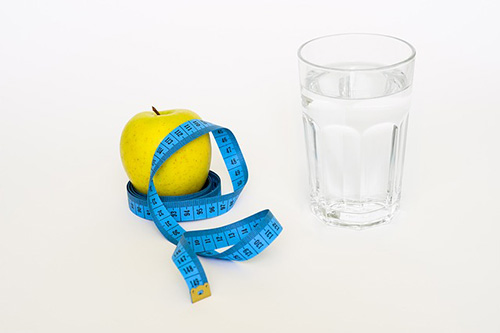Benefits of Drinking Water For Weight Loss
Benefits of Drinking Water For Weight Loss
January 18, 2016 at 7:38 PM

Water is the second most popular beverage among Americans, behind soft drinks. Water is a much healthier choice than soda that keeps the body hydrated, removes toxins, prevents kidney stones, and can even help you lose weight.
Water helps with weight loss in several ways. It boosts metabolism so calories are burned more efficiently. It removes waste from the body and can make you feel full so you will eat less. Drinking water can also make your body stop retaining water, so you can lose water weight and have more energy.
Since water is an appetite suppressant, drinking it before meals can make you feel fuller so you will eat less food. According to Web MD, drinking water before a meal reduces food intake by an average of 75 calories. Drinking a glass of water before one meal every day could cause you to eat 27,000 fewer calories and lose about eight pounds over the course of a year. You could lose even more by drinking water before every meal. Eating water-rich foods such as fruits and vegetables can also help you cut calories. These foods are absorbed more slowly and can help you feel full.
Instead of drinking high-calories beverages like soda, reach for a glass of water. If plain water tastes boring to you, add a slice of lemon to make it taste better. The pectin in lemons can reduce food cravings.
Drinking water ice cold can boost your metabolism because your body will have to work harder to warm it up. This will burn more calories and help you lose weight. Ice cold water also tastes refreshing.
If the cells in your muscles do not have the appropriate balance of fluids and electrolytes, you can experience muscle fatigue. This can cause your athletic performance to suffer. It is therefore important to drink water while exercising. The American College of Sports Medicine recommends drinking 17 ounces of fluids two hours before exercising and drinking fluids while exercising to replace those that are lost by sweating. If you keep yourself hydrated during a workout, it will help you have a stronger and more efficient session.
Painful kidney stones are becoming more common. One of the reasons could be that people are not drinking enough water. Water dilutes salts and minerals in urine that form kidney stones.
The amount of water you should drink every day depends on a variety of factors, including your gender, size, weight, activity level, how much you exercise, how much you sweat, and the weather. The Institute of Medicine recommends that men drink about 13 cups of beverages and women drink about nine cups per day. An interesting fact is that if you feel thirsty, that is your body's way of telling you that it is already a bit dehydrated.
You can increase your water consumption by drinking a glass with every meal and keeping a bottle of water with you in your car or at work during the day. Choose beverages you enjoy that are low in calories. You can also increase your hydration by eating more fruits and vegetables. People get about 20 percent of their fluid intake from food.


